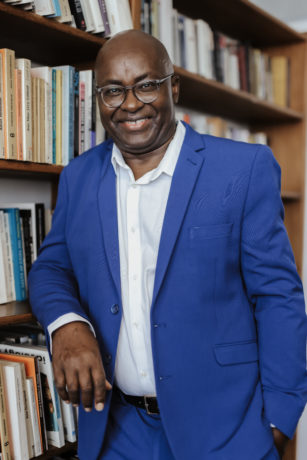The Holberg Prize – one of the largest international prizes awarded annually to an outstanding researcher in the humanities, social sciences, law or theology – named Cameroonian scholar Achille Mbembe as its 2024 Laureate.
Achille Mbembe is research professor of history and politics at the Wits Institute for Social and Economic Research, at the University of the Witwatersrand, Johannesburg. He is also the Director of the Innovation Foundation for Democracy. He will receive the award of NOK 6,000,000 (approx. EUR 525,000) during a 6 June ceremony at the University of Bergen, Norway.
Mbembe is one of the most read and cited scholars from the African continent and receives the prize for his pioneering research in African history, postcolonial studies, humanities, and social science over four decades. Both as an academic and as a public intellectual, he is known for his ability to bridge existing thinking on colonialism and decolonisation with pressing questions on topics such as contemporary migration regimes, global citizenship, restitution and reparation, technology, climate change and planetary futures.
As a historian and a political philosopher, Mbembe has been most concerned about the entanglement of Europe and its former colonies. Using Africa as a point of departure for a mode of thinking that is continuous with multiple and interlocking lineages, he has revealed the extent to which the continent is a living laboratory of thought forms and ideas, a vast world of invention, imagination and creativity.
As a critical theorist, his deliberations on the global order have left an enduring mark far beyond debates on postcolonialism. Drawing on African experiences, Mbembe has played a major role in advancing thinking beyond identity and difference, particularly through concepts such as ‘necropolitics’, ‘the universal right to breathe’, or ‘the earthly community’, which speak to the ongoing struggles for recognition and repair as well as care and dignity in a racialized world.
Originally written in French, Mbembe’s books and numerous articles have been translated into seventeen languages. His key books include On the Postcolony (2000/2001), Out of the Dark Night (2010/2021),Necropolitics (2016/2019), Brutalism (2020/2024) and The Earthly Community: Reflections on the Last Utopia (2022), as well as the groundbreaking Critique of Black Reason (2013/2017)—a philosophical study of the meaning of Blackness as it historically emerged. In Necropolitics, Mbembe examines how power structures wield control over life and mortality, shaping the very fabric of existence for oppressed communities.
Describing the key purpose of his work, the Laureate asks: “What are the conditions for rethinking the world in a way that opens up alternative ways of inhabiting it, of being-in-common and of nurturing a planetary consciousness?” “How to think an open future that moves beyond the history of race, colonialism and segregation with which the present is so deeply entangled,” Mbembe continues. “These questions have been at the heart of my research over the span of my career. Behind them lurks an even bigger issue, that of life futures—how can life be repaired, reproduced, sustained and cared for, made durable and universally shared?”
“Mbembe’s oeuvre goes beyond a particularized notion of decolonization to a universalist recentring of the human”, says Holberg Committee Chair Heike Krieger. “For him, this involves a dedication to facing historical truth, while learning and remembering across South-North divides.”

Photo © Chanté Schatz, University of the Witwatersrand
